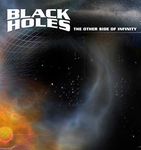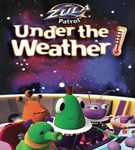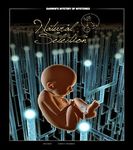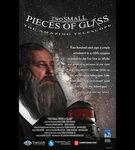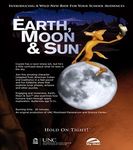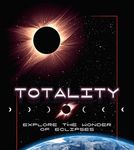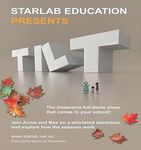Full Dome Show Synopsis - Full dome shows are available in our immersive dome theatre and planetarium forming part of our curriculum-based ...
←
→
Page content transcription
If your browser does not render page correctly, please read the page content below
Full Dome Show Synopsis
Full dome shows are available in our immersive dome theatre and planetarium forming part
of our curriculum-based programs for years Prep to 10.
Zula Patrol: Under the Weather - (Prep to Year 2)
This animated adventure is selected to inspire, entertain and educate lower primary school
students about the weather. What is the weather? What is the weather made from? The Zula
Patrol are on an expedition collecting samples of weather on planet Zula for scientist Multo’s
research, using their loyal pet Gorga’s ability to collect and bottle all kinds of weather. When the
Zula gang inadvertently hurt Gorga’s feelings, he decides to leave Zula and find another planet to
live on. Interplanetary villain Dark Truder tricks Gorga into stealing the weather from other planets
as part of his latest devious scheme to rule the universe. The Zula Patrol go after him. In the
process, they learn all about the weather, both terrestrial & interplanetary.
Tilt: How the seasons work - (Prep to Year 3)
When the seasons go crazy it’s up to Annie and Max to set things right. But fixing this will take
something extraordinary, and a little help. Come on a whirlwind adventure as the siblings
learn just how the seasons work and discover that sometimes, all we need is a new angle on
the world.
Incorporate ‘TILT’ as part of year 1 science understanding with Starlab Education’s program
on observable changes in the sky and landscape, patterns of events that occur in the sky
including the appearance of the moon and stars, weather and seasons.
Secret of the Cardboard Rocket: Exhilarating rocket ride to the planets - (Prep to Year 3)
Two young adventurers embark on a breathtaking up-close look at each of the planets in our
solar system with guidance from a wise astronomy book. With ‘Book’ as their guide, the
adventurers use their imagination to rocket through the solar system, landing on Venus, Mars
and Pluto, blasting through the ‘great red spot’ on Jupiter, and viewing the sun and other
planets from close vantage points. ‘Book’ relays interesting facts about each object ensuring
students gain valuable knowledge whilst on their wild imaginary ride. From the boiling
surface of the sun to the icy rings of Saturn, the incredible scenery in motion will mesmerize
all young adventurers.
Earth’s Wild Ride: Earth’s history, asteroid impacts, volcanoes & raging rivers - (Years 1 to 4)
Earth’s Wild Ride is a journey that immerses audiences in a 3D tour of Earth’s history and
natural wonders including the Earth’s changing surface. Set on the surface of the Moon in the
year 2081, a grandfather and his grandchildren gaze out into space. As they watch the
Moon’s shadow move across Earth, the grandfather tells stories of crashing asteroids,
erupting volcanoes, roaring dinosaurs, electrifying lightning, booming thunder and raging
rivers carving through the land. While learning about eclipses, the ice age, Earth’s water cycle
and differences between the Earth and Moon, the audience is taken on a roller-coaster-like
ride through canyons of raging rivers and hot flowing lava.
Earth, Moon & Sun: Earth’s Rotation, day & night, shadows & moon phases –
(Years 3 to 7)
This planetarium show explores the relationship between the Earth, Moon and Sun with the
help of Coyote, an amusing character adapted from Native American oral traditions who has
many misconceptions about our home planet and its most familiar neighbours. His confusion
about the universe makes viewers think about how the Earth, Moon and Sun work together
as a system. Native American stories are used throughout the show to help distinguish
between myths and science.Oasis in Space: An in-depth examination of planets, orbits, composition & our place in space (Years 4 to 10+) Experience a journey through the solar system and gaze at beautiful images of the planets, their orbits and satellites. Explore Earth with its vast oceans that make life possible. One by one, fly by the planets and moons of our solar system, accompanied by full descriptions of their characteristics including the atmosphere, temperature and composition. With spectacular visual effects, students are inspired to draw their own conclusions about orbiting bodies in our solar system. Is there water out there? Is there life beyond Earth? To Space & Back: How space technology influences our everyday lives. (Years 5 to 10+) To Space & Back takes audiences on an incredible journey from the far reaches of our known universe to our planet. This is an extraordinary story of human ingenuity and incredible engineering, describing how the technology that transports us to space is paving the way for the devices and applications we use every day. What is happening above is coming back down to Earth. Ice Worlds: (Years 6 to 10+) Explore the icy landscapes of our solar system, especially our home planet Earth in the Arctic and Antarctic regions. Explore the critical relationship between ice and life. The Earth is a dynamic planet with a global climate that is always changing. The amount of ice trapped over land in the Polar Regions determines sea level and the amount of solar energy absorbed by the planet as bright reflective ice transforms into dark absorbing oceans. The interplay of life and ice on Earth, from microbes to humans, raises questions about the ice worlds of our solar system. Will they have microscopic life? Will they be suitable for humans to explore? Can they help us understand Earth’s changing polar habitats and protect their pristine beauty? Totality: A complete examination of eclipses. (Years 7-10+) How do solar and lunar eclipses occur and what happens when they do? See what happens when you are caught in the shadow of the moon as the sun is plunged into a solar eclipse. Learn how to safely observe an eclipse. Black Holes: The Other Side of Infinity - (Years 6 to 10+) The Life Cycle of a Super Giant Star as it becomes a Black Hole A truly exhilarating experience with one of the most successful full dome shows ever produced. Narrated by Academy-Award nominated actor Liam Neeson, this cutting-edge production features visualizations of cosmic phenomena to bring the current science of black holes to the dome screen. Audiences will be dazzled with striking, immersive animations of the formation of the early universe, star birth and death, the collision of giant galaxies, and a simulated flight to a supermassive black hole lurking at the centre of our own Milky Way Galaxy.
Origins of Life: - (Years 5 to 10+) Explore some of the most profound questions of life science: the origins of life and the human search for life beyond Earth. Starting with the Big Bang, in chronological order, the ‘Origins of Life’ deals with the prebiotic chemistry in the Universe, the formation of stars, the formation of solar systems, and the first life on Earth. Furthermore, ‘Origins of Life’ covers the great extinctions as well as our search for primitive life beyond planet Earth. ‘Origins of Life’ is an inspirational journey through time and a celebration of life on Earth. It features many recent discoveries related to life science, demonstrating that if there was ever a time that science made its greatest advances, it’s right now! Natural Selection: - (Years 8 to 10+) Join the young Charles Darwin on an adventurous voyage of exploration circumnavigating the world with the HMS Beagle. In Victorian times many physical phenomena had already been discovered and described by natural laws, but life’s most eloquent mechanism was still unknown: ‘How could new species arise to replace those lost in extinction?’ It was time for someone to present a Naturalist explanation of this mystery of mysteries. Witness the thrill of scientific discovery by seeing the world through Charles Darwin’s eyes, make observations of the most beautiful natural scenery and let the pieces of the scientific puzzle slowly but surely fall into place. Charles Darwin himself reveals this simple and most beautiful mechanism that explains the Evolution of all Life on Earth. Cosmology: Big Bang & size of the universe. (Years 10+) The study of our universe is as old as time, yet our understanding of the origins and nature of the universe is less than 100 years old. Cosmology provides an overview of the science of cosmology from the earliest theories about the size of the universe to the big bang. It details how our understanding has evolved over time. Two Small Pieces of Glass (General Audience & Night Activities) Learn how the telescope has helped us understand our place in space and how telescopes continue to expand our understanding of the Universe. Learn about the history of the telescope; see how telescopes work and how the largest observatories in the world use these instruments to explore the mysteries of the universe. Capcom Go – The Apollo Story (General Audience, Years 4+) Just over 50 years ago the first human walked on the moon. Discover the story behind this historic achievement which will inspire the next generation of explorers and dreamers. This is a true story of human endeavour highlighting the risks, challenges and remarkable engineering accomplishments to put humans on the moon.
You can also read



